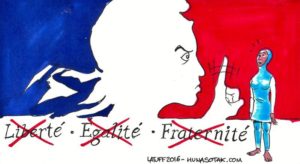Republished in OpenDemocracy

The legendary African-American novelist James Baldwin once noted on his trip to France, in 1949, the extent of violence “Paris policemen could do to Arab peanut vendors.” The crime of an Arab, it seems, was to be visible, and therefore it was safer for Arabs to be invisible, with the help of the French authorities – be it through the prison cell or the ironing out of their cultural distinctions in the public sphere.
Yet I have always found it quite peculiar this French manner of discriminating against the visible in order to make them invisible – often the people France needs the most.
My encounter with French racism and hypocrisy came about when I stayed in northern Paris in the autumn of 2009, at a bed and breakfast place. I was hosted by an upper-middle class mother who, during a chilly October morning over breakfast, told me about her work in art/decor and went on to disclose her politics as “left and progressive.”
Yet soon enough she mouthed off racist statements against Arabs (apparently I was the “civilised” Arab that would be sympathetic to her rants). Then she moved onto, specifically, abusing Algerians, then onto Muslim women who wore the veil. The only “concession” she could make was that French colonialism brought its “subjects” back in the form that France has to do deal with today. Before I could reply, she had to “urgently” leave for work. Exhausted from her conversation, I sat back at the breakfast table, in a beautiful 1850s apartment from the Baron Haussmann era, trying to wrap my head around all that she had said (I usually hear bigots out to the end, and try to deconstruct their line of thinking).
At that point, I heard the echoes of Arabic singing reverberating through the courtyard of the building’s interior. I peered out the window to see a group of Algerians/Moroccans fixing the broken pipes. I gazed down with despondence and voiced to myself: “How utterly sad France is, many of you are the backbone of this country. The French need you but don’t want to see you.”
This set off a series of questions that I would ask Arab residents of the city and make careful observations of race relations.
There was something haunting and disturbing about the necessity and invisibility of these workers. This shed some light on French hypocrisy and their craven need for cheap labour that often comes out of France’s thriving shadow economy, that mutually complements the official economy, which is populated with immigrants, their descendants, and refugees.
The French need Arabs for service and maintenance, but only when such Arabs are doing so out of sight.
The French need black Africans in restaurants, but as long as they are in the kitchen and not the ones serving the customer (more than enough East Europeans to do that).
The French don’t mind the poor Muslim woman who is veiled as long as she is scrubbing their apartment and office floors on her knees but God forbid if her kind invades French recreational spaces and attempts to be equal on her terms.
The Burkini was a non-issue elevated to a political and identity war. It took a non-issue to expose, again, the hypocrisy of France’s ideals and understanding of liberalism and feminism.
The poisonous sting of hypocrisy will not only consume the intended target – Arabs and Muslims. But it sets irreversible precedents and opens up pores in the nation’s body politic to illiberal infection from all directions. The rise of the far right is one obvious example, but they are just one manifestation of a larger ominous current that is yet to come. One should never think the xenophobic tide will stop at Arabs and Muslims. Hatred never runs on rational thought, it is irrational and all-pervasive, and will seek new targets once it exhausts its initial victims. Supposed liberals and feminists are not only aiding and abetting in this assault, but are conducting a grievous self-harm that will see their legitimacy undermined, value system compromised, and ethical standards dismantled. The consequence is that it will leave them vulnerable, in a worst-case scenario, to French anti-democratic political forces that will seek their destruction or cooptation. French history is testament to such undesirable possibilities.
When Baldwin was imprisoned in Paris for an unintentional petty crime (he used bedsheets that his acquaintance had stolen from another hotel!), he observed that, unlike the other lifeless clay-like prisoners in his cell, the “North Africans, old and young, who seemed the only living people in this place because they yet retained the grace to be bewildered.”
The woman on the beach in her human quest to be visible, had the grace, understandably, to be bewildered. A large swathe of your citizens are bewildered, France. The world is bewildered, France.
References
James Baldwin, “Equal in Paris” in James Baldwin, Collected Essays (New York: Library of America, 1998) pp. 101-116.
